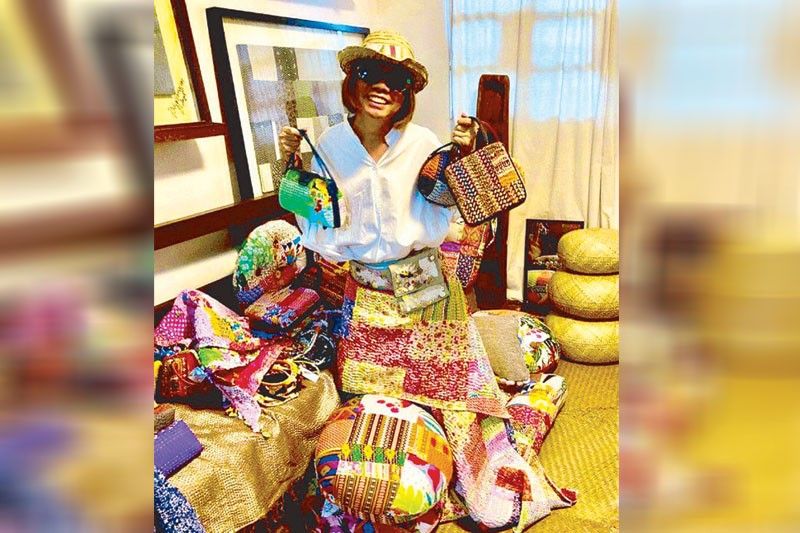Habi puts a pop of pinoy color & character into homes & fashion

In November 2019, Maryjo Feraren was at the International Bazaar, manning the booth of HABI, the local group that champions the promotion, enhancement and preservation of indigenous textiles. Occasionally, she would take quick breaks to check out the exhibit’s other vendors. “I noticed this particular vendor with so many shoppers, crowding and buying his one-of-a-kind creations,” she says.
That vendor was Philip Torres, founder and designer of Pidayit, a brand named after the Kapampangan word for putting fabrics together to create a new one. It’s an apt name for Torres’s style and personal mantra to “reduce, reuse, and recycle” — in his case, 20 years’ worth of luxurious scrap material, into something fresh, exciting, and like no other.
“Pidayit actually started from piles and piles of swatches, remnants from the fabrics ordered by clients. They were so fabulous that it would be almost unlawful to throw them out just like that,” says Torres. “I was in love with fabrics! I knew in my heart they’d be put to good use one day, and it took me three decades to arrive at this concept that would serve a higher purpose.”

Fast-forward to 2021 and Pidayit is among the over 30 exhibitors of Likhang HABI Kalayaan Online Fair, the fifth online trade fair of HABI: The Philippine Textile Council since the first one in October 2020. Accessed through www.shophabifair.com, the virtual fair runs until this Sunday, June 20, and features an eye-catching and irresistible array of home, fashion and lifestyle finds handcrafted with great care and detail by local artisans representing different weaving communities in the country.
“Pidayit is an up-and-coming brand that uses our Philippine textiles in a younger, more approachable way,” says Mia Villanueva, HABI board member. “It also focuses on upcycling and sewing together scraps to make new and beautiful items. I think this is a great representation of Philippine ingenuity and creativity.”
“Philip is so friendly, and he knows his craft,” avers Feraren, chairperson of Likhang HABI Kalayaan Online Fair. “You can really see the intricate details he puts into each of his items. His shawls and barong are like tapestries — they’re all limited edition, one of a kind.”
Anyone who dismisses Filipiniana as nothing more than native or national costume is in for a pleasant surprise with Pidayit. With their seemingly random combinations of retazos in clashing colors and busy patterns, the brand’s throw pillows and decorative blankets add a young, playful and joyful touch to any home.

Whether you choose to wear a Pidayit shawl (fabric combinations layered with colorful buttons, appliques, beading, and countless stuffed fabric resembling tiny pin cushions), crossbody bag (again, the trademark patchwork with large, colorful running stitches), or barong Tagalog (various types of lace on the front panels lend an attractive texture to the formal shirt), prepare to stand out and draw attention.
“Most of the patterns, textures and color schemes are inspired by specific motifs that come from a happy place,” explains Torres of the Filipino-ness of his creations. “If our western counterparts base theirs on the four seasons, Pidayit evokes memories and experiences of our rich Filipino culture such as town fiestas, Santacruzans, Semana Santa, Christmas, and even Filipino cuisine, tourist spots, beaches and sunsets! This creates a character unique yet familiar to us Filipinos, which we can be proud of.”
As for the handiwork that goes into every Pidayit piece, that’s Pinoy talent for you. “The meticulous and painstaking craftsmanship speaks for itself,” says the designer, who, since 2015, has been providing livelihood to the neglected sector of society — unemployed stay-at-home women, out-of-school youth, and underqualified working students. “When you wear Pidayit, you wear hours of dedicated labor by hand, which makes each piece unique and special, like a book with its own story to tell.”
Such a meaningful — and nationalistic — back story explains why the label has found favor with the likes of art advocate Bea Zobel, media personality Kris Aquino, and local fashion designers Dita Sandico and Patis Tesoro, both purveyors of Pinoy fabric and artistry. Yet for all the great strides achieved by Pidayit and other homegrown brands, Torres acknowledges that they still have a long way to go before they can achieve the level of acceptance and prestige enjoyed by international brands in the Philippines.

“I guess Filipinos learn to appreciate and embrace their heritage once they step out of the country, which is often the case,” he notes. “It’s just sad that Filipinos rely on validation by foreigners before they are able to appreciate their own skin, so to speak.”
Indeed, there is much to appreciate about local artistry, beginning with Pidayit, which produces happy, whimsical, proudly Filipino fashion and accessories with an impact that goes well beyond perking up a staidly wardrobe or room.
Taking time during the pandemic’s lockdown to reflect on his life and work, Torres says, “My workers’ welfare will always come first. Their trained hands don’t just provide food on their table or send their children to school; they contribute to the preservation of Kapampangan culture and arts, through fashion.”






















